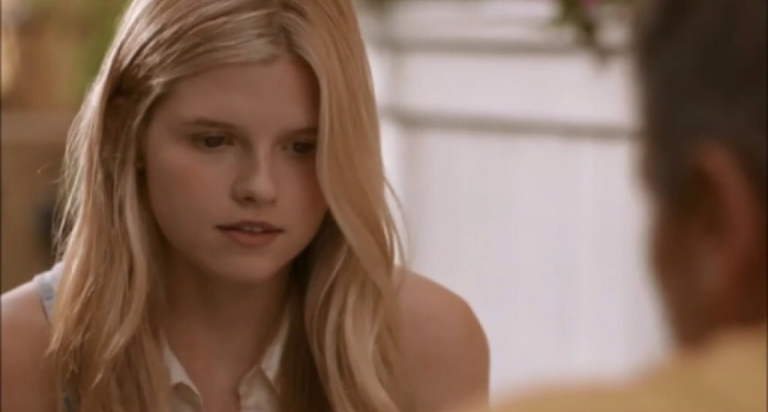I had grave reservations (grave! I tells ya) about going to see Marya Cohen’s auteurial debut, The Girl In The Book: The trailers made it seem like one of these neo-Victorian cautionary tales (cf. An Education) where a woman’s life is ruined by some particularly compelling older man exploiting her youth and desire for attention from a sophisticated adult. It happens, of course. It happens frequently enough that this used to be a staple of cautionary literature aimed at girls, and also, em, less cautionary material. But it’s icky on a lot of levels.
Critics rate it very highly, and audiences find it passable, to boot. A lot of bad signs.
This is one of those times when a reviewer takes their taste about a movie and then seeks to justify it retroactively. Having established this is not my kind of movie, I (and the Boy!) both ended up liking it. I’ll try to explain why, but you should take my explanations with a grain of salt.

The downcast eyes: Sign of easy prey.
The story is split between Young Alice (Ana Mulvoy-Ten), latchkey child of privilege, who is being seduced by famous (foreign!) writer Milan (Michael Nyqvist), and adult Alice (Emily Van Camp), whose life is a shamble of overbearing older males and one-night-stands. Though, Amy Schumer notwithstanding, she doesn’t actually find this lifestyle enjoyable. It’s more a compulsion. And, of course, Alice draws a pretty straight line between her experiences with Milan and her dysfunction, though her already neglectful parents drive the nail into her emotional coffin at the climax of the film.
Her rape—and I believe that’s the correct word, even though her sexual abuse is apparently a single, “minor” incident—is not limited to the physical. The (apparent) hack Milan steals her emotional life for his book, then dissembles about the origin. Years later, old Alice and Milan are actually both living in its shadow. (But honestly, who gives a crap about Milan? Creep.)
Alice’s story follows the basic arc it must (from a narrative sense) of her life having an equilibrium (awful as it is), to being upset by an arrival (in this case, a special edition of the book that is essentially about her), to having her achievements validated and invalidated, until she hits rock-bottom and really screws up her life. The denouement has been criticized for being “pat”, and there’s truth in that, but considering the alternatives (drawing the movie out, making it ambiguous, or making it darker than it needed to be), I preferred Cohen’s choice to any I could think of.

Doesn’t she look “well-adjusted”?
So, why does it work? The acting is quite good, though I’m such a dunce that I was marveling out how well Van Camp was playing a 14-year-old along with her 30-year-old self. (I could not find a picture of them together, though!) So, Mulvoy-Ten is actually about the age of her character—which makes Nyqvist’s groping even creepier, I suppose—but manages to play the role with an unselfconscious innocence that has the bravado of the teen and a heart-breaking vulnerability. But Van Camp has the tougher role: It’s 15 years later and she hasn’t really come to grips with this event she feels dictates her life. There’s a serious risk of her coming off as, well, whiny.
And Van Camp does not. This is partly a testament to her acting—because her character is highly flawed in certain very unappealing ways—and partly a testament to Cohen’s tight writing. In a genre that tends to emphasize feelings, her script manages to make space for characters to express emotions without letting them use them as an excuse.
That’s going to be my justification for why I liked this: Alice ends up being someone you root for, and her various antagonists are not cartoonish, even when they kind of are (Michael Cristofer, as dad, is so overbearingly awful, you’d be tempted to disbelieve him if you didn’t know people like that). Van Camp/Mulvoy-Ten are ably supported by Cristofer, Talia Balsam (Martin’s daughter with Van Patten!) as mom, David Call as the boyfriend, Emmett, and especially Ali Ahn as Alice’s bestie, Sadie.

Rooting for normalcy.
Alice and Sadie’s relationship is really strong, in terms of its own arc, and it adds a lot to the film. Alice and Emmett’s relationship feels more like a MacGuffin than a real thing, but it kind of has to be: This is Alice’s journey and whether or not she can have a real relationship is a big part of the journey.
I didn’t know who any of these people were, except Nyqvist (The Girl With The Dragon Tattoo) and Call, who by sheer coincidence was in James White. I think that cast is TV people, mostly, but they were all very good.
It comes in at a brisk 80+ minutes, too, which we appreciated. Part of what makes these difficult-to-watch movies impossible-to-watch is wallowing in their own crapulence. (“Crapulence” isn’t the best word for it, but how often do you get to write “Wallowing in their own crapulence”?) It can be almost torture porn when these things luxuriate over abuse or in the fallout thereof.
So, yeah, we liked it. It’s not an unqualified recommendation to hand out to strangers on the street, though I wouldn’t object to The Flower (or any girl young Alice’s age) seeing it. Forewarned and all that.

One of the year’s best screen friendships.

One thought on “The Girl In The Book”